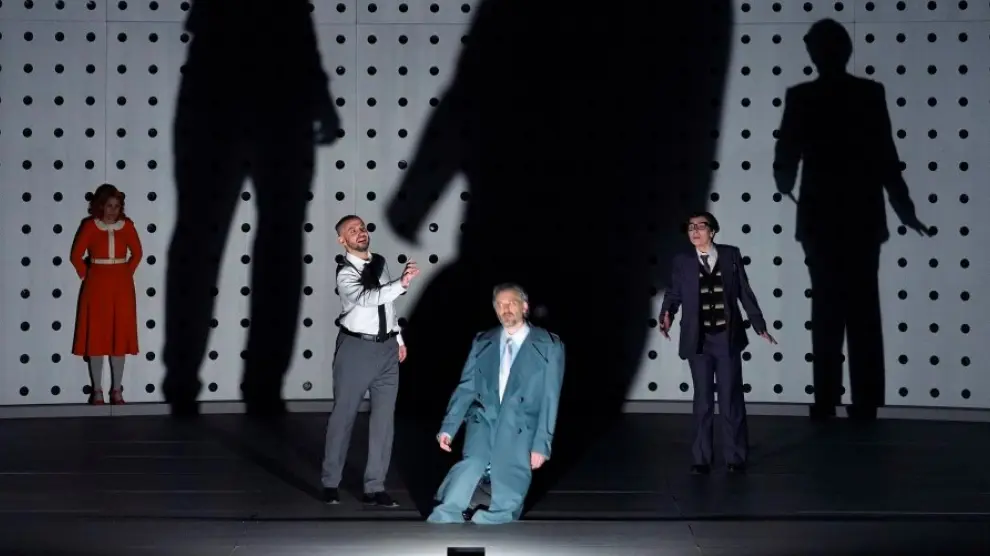Madrid, March 23, 2025.
In 1770, Mozart (then aged 14) was known as a child prodigy. During his childhood, he toured with his father throughout Europe. While touring Italy, at the age of 14, he set to music a story by Jean Racine, Mitridate, in the Italian translation by Giuseppe Parini. When it was premiered on December 26, 1770 in Milan, it was a huge success, running for 21 performances. No one expected that a teenager could compose an opera like this: a tragic struggle for power and love amidst a royal family in the Classical era, with such powerful music and such a difficult coloratura, demanding virtuoso singers, in the style of the most typical opera seria.
At the Teatro Real, this opera was performed in concert version by Mark Minkowski and Les Musiciens du Louvre in 2005. Twenty years later, this opera returns in a stage version. It does in a new staging directed by Claus Guth, regularly invited to stage direct in Madrid, who sets the work in more modern times than the original, which took place in Anatolia in the 1st century BC. Mr. Guth's house mark is a rotating set, in this case a mansion from the 1950s, 60s, or 70s, on one side, where the plot takes place, and on the other, an almost empty stage, dominated only by an enormous wall with multiple holes, in which the internal conflicts of the characters take place, apart from the action taking place in the house, in which avatars of the characters of Aspasia, Mitridate, and Sifare intervene, as well as characters completely dressed in black, shadows, and spirits that stalk these characters. As in a very rich family, there is a butler who is almost omnipresent. In this approach, it seems that Mitridate is the patriarch, possibly a mafioso who owns a commercial empire, that Farnace is a braggart, an alpha male, while Sifare is a young, lovelorn, geek teenager, looking like a fool but with more temper than he seems. Mitridate and Farnace are violent characters, eager for power and revenge, and it is Sifare and Aspasia who bear the consequences. At the end of the opera Mitridate advances to the center of stage, mortally wounded, and the other characters walk with difficulty around the wall, as if drawn by the protagonist's fate.
I still remember the first time I saw Ivor Bolton , who is in his last season as Teatro Real's principal conductor. It was in the Glück's controversial Alceste 2014 staginf, directed by Warlikowski, during the final days of Gerard Mortier's life. For a decade, Mr. Bolton has given us memorable performances of Britten's operas, and some good and other more average interpretations of Baroque operas and Mozart. On this occasion, Mr. Bolton conducted the Teatro Real Orchestra in a rather slow and average version. There was little brilliance, except for the hornist Jorge Monte de Fez , who accompanied Sifare's great aria in the second act.
Juan Francisco Gatell , who sang in the legendary Così fan Tutte conducted by Michael Haneke a decade ago, sings the title role, in a correct rendition, although he has some problems with the high notes. In fact, I wondered, given my ignorance of this repertoire, if Juan Sancho , in the brief role of Marzio, of whose aria he gave an excellent interpretation, would have sung the role of Mitridate better. The famous Argentinian countertenor Franco Fagioli , can command the devilish coloratura of the role of Farnace, with his contralto voice, with impressive low notes, but also capable of moving with prolonged high notes as in his great aria Già dagli occhi, with which he delighted the audience. The countertenor Franko Klisovic sang Arbate with a powerful voice.
However, it was the female voices that led the show. Sara Blanch sang the role of Aspasia, with impressive command of coloratura from her very first aria. Elsa Dreisig, an acclaimed soprano in the Mozart repertoire, sang the role of the Sifare with a beautiful voice and also mastered coloratura. Marina Monzó , highly acclaimed in Spain, sang the role of Ismene, replacing the star Pretty Yende. Monzó is a very good soprano, and she sang the arias of this character beautifully and with perfect vocals.
Being the premiere, the presence of papparazzis and TV cameras signaled the presence of celebrities, as the premieres at the Teatro Real are among the most important social events for the local jet set. But beyond that, the audience gave the singers, especially the women, ovations, and there were no particular boos for the stage crew.





No hay comentarios:
Publicar un comentario